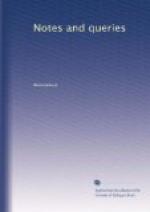1. A., B., (C., &c.), have a common friend X.
2. A. and B. entertain a mutual esteem for each other.
3. B. has a regard for A., and A. has a reciprocal regard for B.
In the passage quoted by Mr. Gatty (Vol. i., p. 440.), I think, with deference to the eminent historian whom he cites, that reciprocal should have been written instead of mutual.
B.H.K.
Juice Cups.—Should no more satisfactory Reply to the Query of N.B. (Vol. ii., p. 89.) present itself, the following suggestions may be acceptable to him. Without pretending to professional knowledge on the point, I conceive that the use of an inverted cup in the centre of a fruit pie is two-fold. It answers the purpose of supporting the crust, which, being usually thin and light, has but little strength in itself, probably less than that of a meat pie, while, by the shrinking of the fruit in baking it is left unsupported: and it further serves, not indeed as some good ladies seem to suppose, to increase the quantity of juice, but to keep a portion of it in reserve; so that the pie may not become too dry when a few spoonfuls of its more liquid contents have been taken out. {175} This, I conceive, it effects in the following manner. It contains, when inserted, a considerable quantity of cold air. This expands as the pie is heated in the oven, until it drives out from under the cup all, or nearly all, of the fluid that has originally collected under it; and then, continuing to expand, much of the air escapes through the air-holes of the pie into the oven. As the pie cools, the portion of air remaining under the cup, and which, while heated, was sufficient to fill it, contracts; and then the pressure of the external atmosphere, entering through the air-holes of the pie, and acting upon the surface of the juice round about the cup, forces a portion of it into the cup, just on the same principle that water rises into the chamber or cylinder of a pump when a partial vacuum is formed in it. Having once risen into the cup, the same law of hydrostatic pressure keeps it there until the cup is raised sufficiently to admit air under its edge, when the juice of course escapes.
J.T.S.
Curfew (Vol. ii., p. 103.).—Your correspondent Naboc will find the information he seeks upon this subject in a valuable communication to the Journal of the British Archaeological Association, vol. iv. p. 133, by Mr. Syer Cuming. To Mr. C.’s list may be added, Charter House, London; Newport, S.W.; and Lowestoft, Suffolk.
E.B. Price.
Derivation of Totnes.—From the Anglo-Saxon toten or totten, to project, to rise above, and ness or nes, nose, (French nez, German nase, Latin nasus). Tooting, Tottenham, &c.
B.H.K.




